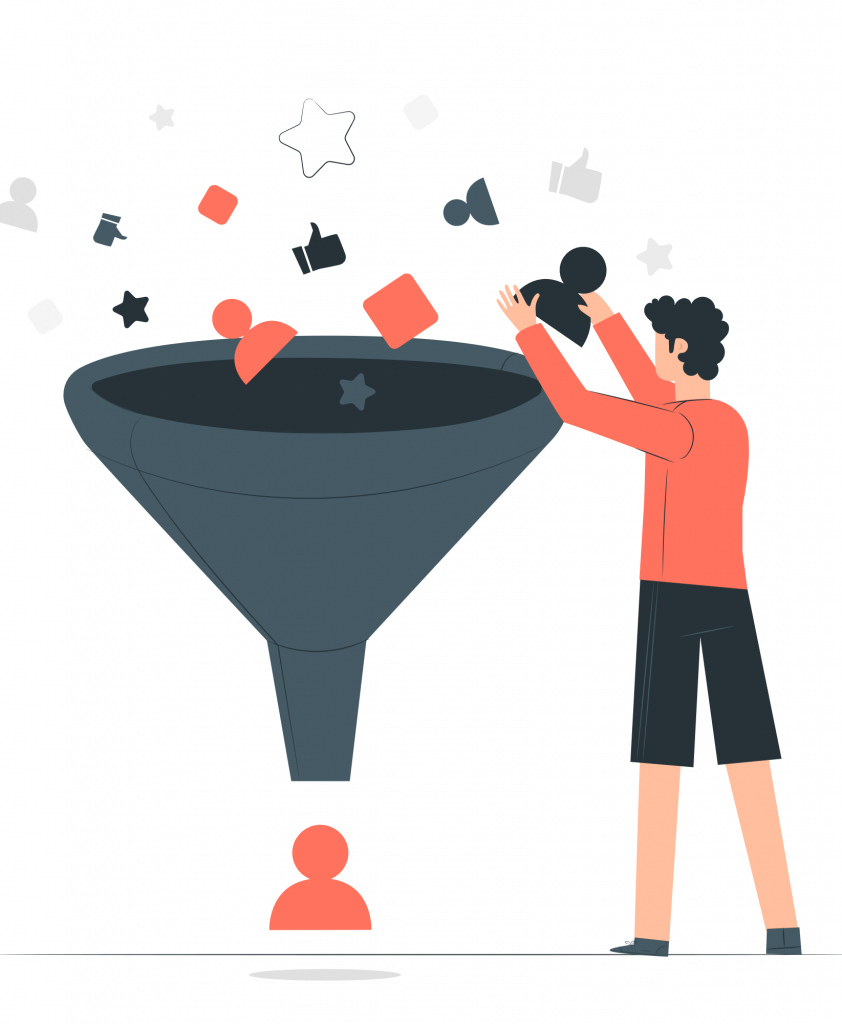If you own a business, then chances are you have heard of the term “marketing funnel”. But what does it mean? Well, simply put, the marketing funnel is a way for businesses to understand and track their customer journey from start to finish. It is an essential tool for any business hoping to gain insight into how customers interact with their brand and service offerings. Let’s dive deeper into what a marketing funnel is and how it can benefit your business.
A marketing funnel is a tool marketers use to visualize the customer journey from awareness of a product or service to conversion into a sale. It is an essential component of effective marketing strategies as it helps track customer engagement and understand buying behavior. A well-defined funnel can help marketers identify trends, pinpoint areas for optimization and channel resources effectively into campaigns that yield the best results.

Table of Contents
Awareness Phase
At this stage of the marketing funnel, potential customers become aware of your brand, product, or service. The goal of this stage is to create a positive first impression and generate interest among your target audience.
During the awareness phase, the focus is on building brand awareness and generating leads. This involves creating content that educates and informs potential customers about your brand and what you offer. This content can take many forms, including blog posts, social media posts, videos, infographics, and more.

It’s important to remember that not all leads generated during this stage will convert into customers. However, by increasing your brand’s visibility and creating a positive first impression, you increase the likelihood that potential customers will consider your brand when they’re ready to make a purchase.
To effectively execute the awareness phase, it’s important to have a clear understanding of your target audience and what channels they use to consume content. This will help you create content that resonates with them and ensure that it reaches them where they are.
Overall, the awareness phase is critical in setting the foundation for a successful marketing funnel. By creating a strong brand presence and generating interest among your target audience, you set the stage for the next stages of the funnel, where you can further engage with potential customers and move them closer to making a purchase.
Desire Phase
The desire phase is the second stage in the marketing funnel, also known as the customer journey or sales funnel. At this stage, potential customers have become aware of your brand, product, or service and have developed an interest in what you offer. The goal of this stage is to further nurture that interest and create a desire for your brand among your target audience.
During the desire phase, the focus is on building brand preference and creating a sense of urgency among potential customers. This involves creating content that highlights the unique features and benefits of your product or service and differentiates it from competitors. This content can take many forms, including case studies, testimonials, product demos, and more.

It’s important to remember that potential customers at this stage are still evaluating their options and may be considering other brands as well. Therefore, it’s important to focus on creating content that helps your brand stand out and reinforces the value that your product or service provides.
To effectively execute the desire phase, it’s important to understand your target audience’s pain points, motivations, and buying preferences. This will help you create content that addresses their specific needs and speaks to their unique interests.
Overall, the desire phase is critical in further engaging potential customers and moving them closer to making a purchase. By creating a strong desire for your brand and emphasizing the unique value that your product or service provides, you increase the likelihood that potential customers will choose your brand over competitors when it’s time to make a purchase.
Conversion Phase
The conversion phase is the third stage in the marketing funnel. At this stage, potential customers have become aware of your brand, developed an interest in what you offer, and have a desire to make a purchase. The goal of this stage is to convert these potential customers into actual customers.
During the conversion phase, the focus is on providing potential customers with the information and incentives they need to take action and make a purchase. This involves creating content that emphasizes the benefits of your product or service, provides clear calls to action, and makes it easy for potential customers to complete the purchase process.

It’s important to remember that potential customers at this stage may still have reservations or concerns about making a purchase. Therefore, it’s important to address any objections or questions they may have and provide reassurance that your product or service is the right choice for them.
To effectively execute the conversion phase, it’s important to have a clear understanding of your target audience’s buying behavior and preferences. This will help you create a purchase process that is user-friendly and makes it easy for potential customers to complete the transaction.
Overall, the conversion phase is critical in turning potential customers into actual customers. By providing the information and incentives they need to take action, you increase the likelihood that they will choose your brand over competitors and complete the purchase process.
Advocacy Phase
The advocacy phase is the final stage in the marketing funnel, also known as the customer journey or sales funnel. At this stage, customers have made a purchase and are satisfied with their experience with your brand. The goal of this stage is to turn satisfied customers into brand advocates who promote your brand to others.
During the advocacy phase, the focus is on creating a positive post-purchase experience for customers and providing opportunities for them to share their experience with others. This involves creating content that encourages customers to leave reviews, refer friends and family, and share their experience on social media.

It’s important to remember that satisfied customers can be a powerful marketing tool, as their recommendations can carry more weight than traditional advertising. Therefore, it’s important to focus on creating a positive post-purchase experience and building strong relationships with customers.
To effectively execute the advocacy phase, it’s important to have a clear understanding of your customers’ needs and preferences. This will help you create a post-purchase experience that is tailored to their specific interests and encourages them to promote your brand to others.
Overall, the advocacy phase is critical in turning satisfied customers into brand advocates and generating positive word-of-mouth marketing for your brand. By providing a positive post-purchase experience and creating opportunities for customers to share their experience with others, you increase the likelihood that they will continue to do business with your brand and promote it to others.
Conclusion
In conclusion, the marketing funnel is a framework that businesses can use to guide potential customers through the various stages of the customer journey, from awareness to advocacy. Each stage of the funnel requires a different approach and focus, from building brand awareness to creating a desire for your product or service, to converting potential customers into actual customers and turning satisfied customers into brand advocates.
By understanding each stage of the funnel and tailoring your marketing efforts to meet the needs and preferences of your target audience, you can effectively guide potential customers through the customer journey and increase the likelihood of converting them into loyal customers. Remember, a successful marketing funnel requires a deep understanding of your target audience, a focus on creating valuable content, and a commitment to providing a positive post-purchase experience that encourages customers to become brand advocates.
Vladimir Dasic
Founder and CEO of Vuk Multimedia, since 2018